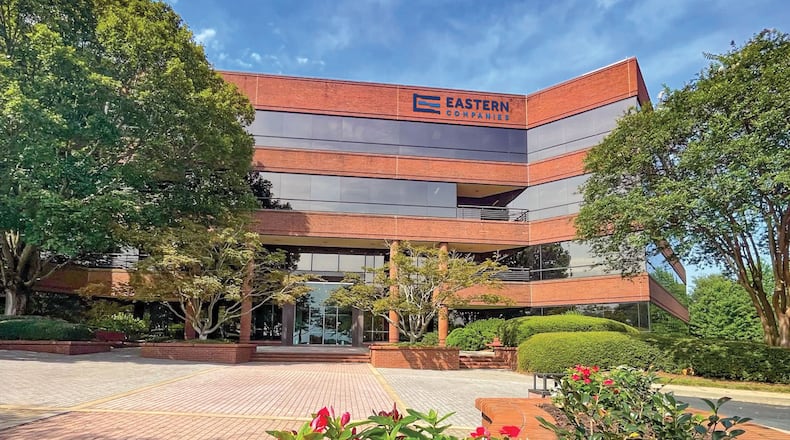The recovery of metro Atlanta’s office market from the doldrums of the pandemic continues to be a tale of winners and losers.
High-end office towers continue to outperform their peers, while the rest grapple with record-setting vacancy and high interest rates that have stymied financial returns for landlords. Owners of underused buildings have struggled to find buyers, leading some to go to foreclosure and others — who are able — to hunker down to try to wait for demand to rebound.
Fewer office buildings are selling, and that lack of activity presents a unique chance for one type of nontraditional buyer: tenants.
“If you’re a tenant of a reasonable size and you’re an all-cash buyer, you have the tremendous opportunity to buy fantastic, once-in-a-lifetime real estate,” said Nathan Williams, a director at Atlanta-based tenant representative firm Scotland Wright Associates.
After the housing collapse that followed the financial crisis more than 15 years ago, buyers with cash took advantage of distressed property sales. A similar dynamic is starting to play out now in Atlanta’s commercial real estate world.
Several companies have decided to move from being tenants to being landlords.
Eastern Companies, a construction firm with development and investment arms, acquired the Park Summit office building in Gwinnett County in May to consolidate its divisions under one roof. The company, which built SK Battery America’s sprawling factory in Jackson County, bought the roughly 86,000-square-foot building at 2675 Breckinridge Blvd. It was about 50% occupied at the time.
Eastern paid $5.25 million in cash to buy the five-story office building, according to county property records, a 25% discount from what the seller paid in 2020.
“It was a perfect time for us to purchase a distressed building,” said Kate Kong, Eastern’s operations manager. Eastern will anchor the building and lease space to others, creating a revenue stream.
Williams and Michael Tucker, CEO of Scotland Wright, represented Eastern in the acquisition. The building’s seller, Atlanta-based Highgate Partners, declined to comment.
Tucker said the lack of competition from traditional real estate investors opens the door to office tenants willing to take on the risk — and potential reward — of becoming their own landlord.
Fuller offices are worth more than emptier ones. With the current high interest rate environments, many banks pulling back on real estate lending and loans coming due, many landlords have found themselves in a bind.
“There are some building office assets that can be acquired where tenants can save money and create an opportunity for them to profit if the interest rate environment changes in the next three to five years,” Tucker said.
Resetting values
The aftershocks of the pandemic, the persistence of remote and hybrid work schedules and the Federal Reserve’s war on inflation have taken their toll on metro Atlanta’s office market.
About one-third of all office square footage in metro Atlanta was available to rent at the end of June, according to real estate services firm CBRE. It was the fifth financial quarter in a row in which the region reached a new high-water mark for unwanted office space.
Buying activity has remained mostly dormant. Landlords saw the number of sizable lease signings increase during the second quarter. But despite that activity, the market hasn’t yet found the floor.
Eight leases of at least 90,000 square feet were signed between April and June, according to real estate services firm JLL. Those deals were concentrated in high-end buildings, which are often called Class A or trophy.
Ryanne Pennington, a JLL senior managing director in Atlanta, called the uptick in activity a “quiet recovery” for the top-end of the region’s office market.
“(Leasing activity) is definitely congregating and aggregating around these highly amenitized buildings,” she said.
Many suburban office buildings, which are often called commodity, have been caught in limbo. Those with high occupancy and stable tenants have mostly weathered the storm, while mid-rises that are half-empty have experienced more pressure, especially due to high interest rates and pending loan repayments.
That widespread distress has led to several office buildings selling for less than their previous purchase price, resetting their values and those of neighboring workspaces. The Urban Land Institute found that most U.S. office properties lost at least 30% of their value by the end of 2023, predicting more declines this year.
Creating stability
Prospective tenants looking at buildings with middling occupancy have a notable advantage, Tucker said.
He said they can “solve most of the vacancy” on their own, which makes it a lot easier for a company to justify owning rather than renting.
Software company Innova Solutions came to that conclusion in January by purchasing the 187,000-square-foot office building at 1455 Lincoln Pkwy. in Dunwoody to relocate its headquarters. Innova planned to occupy two floors that represent more than a fourth of the total building, bringing its occupancy to 82%.
Credit: CBRE
Credit: CBRE
Innova paid $14.55 million in January to buy the eight-story building, county property records show, which was nearly 34% less than the building’s previous owner paid in 2015.
Kong, with Eastern, said her company will occupy one of the floors at its newly acquired Park Summit building, while the rest of the space will be leased to other tenants. Williams, with Scotland Wright, said companies that can create their own stability by purchasing their workplace — and are willing to take on the risks of owning real estate — can take advantage of opportunities across metro Atlanta.
“They’re looking at it as an investment,” he said. “Not just, ‘Hey, we want to pay less on a mortgage for an office building than they would in rent.’”
About the Author
Keep Reading
The Latest
Featured




